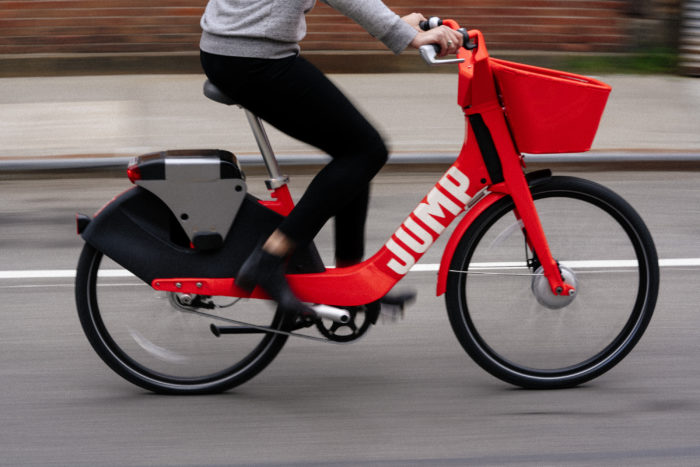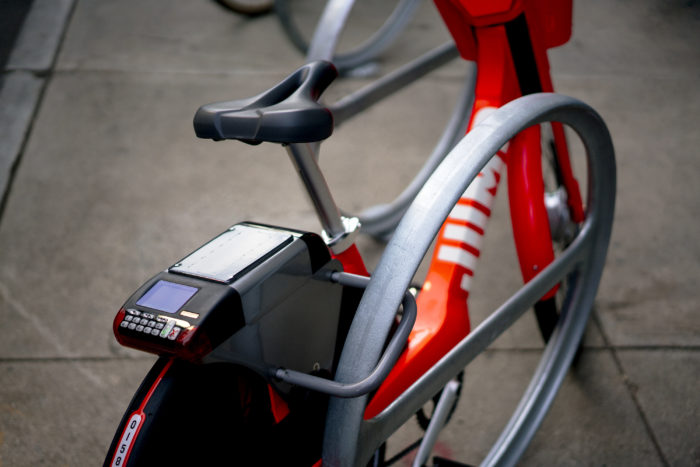Why Uber Is Buying This Brooklyn Bike Sharing Startup
The car-sharing giant acquires Jump, which operates fleets of dockless e-bikes, for a reported $200 million
The company's bikes are pedal-assist, with a small electric motor that gives the rider a bit of a boost (Photos courtesy of Jump)
Uber is best known for its four-wheeled vehicles, but the ride-sharing company’s vision of future transit evidently includes two-wheelers as well. Jump, a Brooklyn-based bike-sharing company, announced today that it is being acquired by San Francisco-based Uber for an amount reported by TechCrunch to be in the vicinity of $200 million. “We see the Uber app as moving from just being about car sharing and car hailing to really helping the consumer get from A to B in the most affordable, most dependable, most convenient way,” Uber CEO Dara Khosrowshahi told the publication.
Launched in 2010, Jump picked up momentum recently with the launch of a fleet of 250 dockless, pedal-assist bikes in San Francisco, as well as a funding round that raised $10 million, bringing its total financing to $11.1 million. Jump’s bikes, which can be parked on sidewalks and unlocked with an app, looks much like a typical bicycle but has the added feature of a small electric motor that “provides a boost whenever you pedal and makes climbing hills and navigating city streets more enjoyable than ever,” the company states. Riders pay $2 for 30 minutes of use.
E-bikes seem likely to become a much more common sight on city streets. Uber’s acquisition of the bike company coincides with New York City’s easing of its ban last week on certain types of e-bikes, which have been controversial because of their ubiquitous use by food-delivery workers. Pedal-assist bikes will now be allowed, but more powerful e-bikes that can reach speeds over 20 mph will still be forbidden.

Jump’s bikes are dockless, meaning they can be locked to bike racks and unlocked with a photo app
Jump founder Ryan Rzepecki first got the idea for his bike-sharing company while studying for his master’s degree in urban planning at Hunter College. He took the idea further while working as a project manager for the New York City Department of Transportation, where he worked in the bike program, helping decide where to put bike racks and conducting field research.
In 2010, Rzepecki founded his company under the name Social Bicycles, which started as a small team that created the first prototypes of their smart bikes, which the company says were the first with integrated GPS, payment systems, and locks. In the last year, the company changed its name to Jump and had deployed more than 12,000 dockless bikes in 40 cities across six countries.
The acquisition comes on the heels of a rough period for Uber, which included charges of sexual harassment, hacking scandals, and changes in leadership. When the Brooklyn team started working with Uber in the development of Uber Bike, a new feature on the Uber app, the Jump team was wary.
“We expected to find a toxic work environment and a broken culture,” wrote Rzepecki in making the sale announcement in a post on Medium. “Instead, everyone we met was smart, passionate, and genuinely wanted to help our team succeed.” He added: “Even more importantly, we could see the shift in the company once Dara was named CEO and he began leading with humility and in a way that we felt reflected our values.”

Rzepecki said he got his idea for the company while studying for his masters degree in urban planning (Ryan Rzepecki photo via LinkedIn)
For his part, Khosrowshahi expressed confidence that the San Francisco test of the Jump system is proof that the concept works. “Our hometown pilot is off to a very strong start, with riders enjoying a convenient and environmentally friendly way to cruise up and down our trademark hills,” the Uber CEO wrote in a company blog post.
Just as New Yorkers adjusted to the idea of Citi Bike docking stations after initial controversy, dockless bikes may become another one of the city’s transit alternatives. Currently no dockless-biking companies have been authorized to operate in the city, but in December the NYC DOT put out a request for expressions of interest from such ventures. “New Yorkers have embraced public bike sharing faster than anyone expected,” said de Blasio in a statement. “These past four years, we’ve strengthened Citi Bike and doubled its size. Now it’s time to take the next big step and bring safe, reliable and affordable bike sharing to even more of the city.”
Rzepecki said his firm’s choice to join Uber was driven by a desire to have a bigger, faster impact on urban transit. “At our core, we are still the same team that is passionate about partnering with cities to increase cycling,” he said in his Medium post, “but joining Uber presents us with the opportunity to realize our dreams faster and at a much larger scale.”













